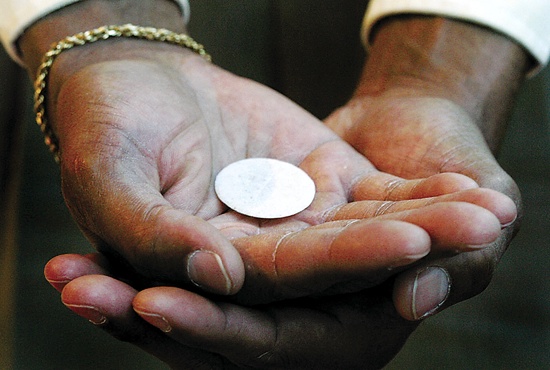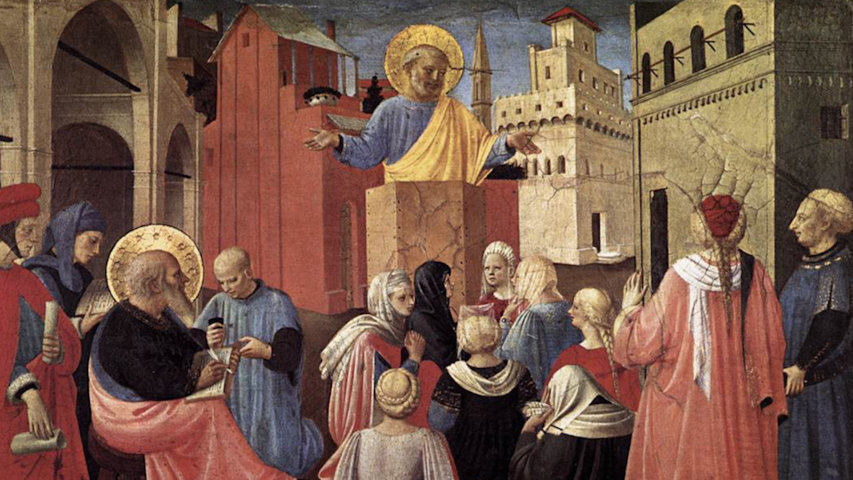16 April 2023 (Easter 2): Acts 2:14, 22-32, 1 Peter 1:3-9 and John 20:19-end
As human beings, we often seek certainty but also find ourselves living with doubts.
There may be times in our lives when guidance and direction are important; or there might be moments when we need space to weigh the questions, trust our instincts.
Some of us might be predisposed to ways of thinking and acting rooted in confidence and clarity; others of us may experience decision-paralysis or imposter-syndrome, being all too familiar with doubt.
Perhaps we say to ourselves ‘I’m not sure’ or ‘I don’t know’ - on the threshold of changes in work or relationships, circumstances. It is rare to hear such phrases in public though.
Someone seeking to change that is Nicola Reindorp, the CEO of Crisis Action. In reflecting on the impact of her own doubtfulness on her career, she decided to explore it in conversation with neuroscientists, counsellors, economists and leaders.
In doing so, she writes [here] that she ‘discovered another side to doubt that is productive and powerful, not the destructive doubt of paralysis and pain, but a productive form of questioning and discovery.’
In a way, her “rebranding” of doubt makes sense: she puts it at the heart of self-awareness and humility, seeing it as a prompt for curiosity and learning. Doubts enable us to interrogate our own biases driving not only innovation but also inclusion and diversity.
Does it help us understand Thomas better? He was someone who elsewhere in John’s gospel speaks openly and directly about his thoughts. Questions don’t seem to phase him. So perhaps it shouldn’t surprise us that his faith and belief was also mediated openly, directly and indeed relationally.
As Rowan Williams puts it: ‘doubting Thomas is often thought of as demanding hard evidence - unless I touch the wounds - and yet it was his encounter with the person of Christ that sparked faith.’
Thomas's doubt leads to a desire for touch; but what he sees inspires his belief, his trust. His testimony opens up space for others to find new purpose, new life.
A better nickname might be ‘inspiring Thomas’ after all!
Does such a rebranding sit alongside what we hear in our text?
The tomb was empty. The doors were locked.
Rumours of resurrection were circulating as fears were pressing in.
Into that place of grief-stricken hearts and troubled minds the risen Lord breathes peace.
To the exhausted, troubled and anxious: peace.
To the fearful, questioning and grieving: peace.
To the curious, hopeful and courageous: peace.
The marks of the nails and the pierced side are visible: the continuity of scars witnessing to the continued presence of the self-giving love of God.
The one breathing peace was of the Father’s love begotten; breathing peace having been betrayed, denied and beaten.
Those wounded hands took the sting out of death and now reach out to places of mistrust, pain, disappointment and guilt.
Those wounded hands also reach out with the balm of love to forgive and heal rather than condemn.
But Thomas was not there.
His doubtfulness means the confidence or charism of the words of others was not enough. He needed to see, to touch, to feel the breath of peace.
Those are productive signs of questioning and discovery rather than a painful paralysis.
He had to take that doubtfulness into the week of waiting, of talking, eating, praying.
Did their joy give space for his questions? Did his curiosity deepen their joy? Did their peace soothe his hurt? Did his interrogation prompt deeper fellowship?
The tomb was empty. The doors were locked.
Stories of resurrection filled the room, fears being dispelled.
Into that place of hearts warmed by conversation, fellowship and prayer another word of peace is spoken.
There is no rebuke or condemnation - simply an invitation for Thomas to reach out, to touch, to see, to trust.
Doubt becomes worship: my Lord and my God!
Evidence and observation becomes unconditional acceptance.
That is not the end of the matter: all this is for our sake - the words, the stories, the testimony, the breath of peace.
All this is written to assure us that we are healed by the same words; that we might put our trust in the promise of renewed life; that we might know ourselves to be loved, forgiven, restored, made whole and blessed.
More than that, in the power of the Spirit, the risen Jesus sends us to transmit that love and forgiveness.
In problem broken bread and outpoured wine, our fragile and fallible bodies are nourished as we are called from penitence to restoration; as we allow love to seep into those locked places of fear.
This new life is a gift but also a process. The Spirit is at work in us - confronting us those things we hide from and cultivating in us new hope and dignity.
This process is held within our community - the accountability we have to one another before God. If doubts are about curiosity, self-awareness and humility - if it prompts our learning and the safe space to interrogate our own biases, questions and weakness - then they have their place.
Together, faith and doubt can be productive: bearing those first fruits of healing, generosity, conviction; rejoicing with those who rejoice, weeping with those who weep.
Hand in hand it staves off those things that paralyse us or hidden growth and change; finding a deeper stability and ways forward that do not coerce, demand or control.
This kind of questioning and discovery drives the processes of forgiveness: being honest with ourselves and knowing what sets others free; the changes that bring hope and liberation; letting go of habits which cause harm.
For the one who breathed peace was the one who endured the worst of humanity - shame, failure, selfishness and betrayal - and burnt it away in the refining fire of a crucible of love.
Perhaps Thomas and Peter strengthened each other in their faith and witness through the way they tested, challenged and encouraged one another. Certainly Peter’s words - in Acts and in his letter - speak of a liberating hope and new life, which is full of gladness, mercy and love.
It is a message, as Willie Jennings puts it, that is ‘far more powerful than its messengers’; it is a remarkable message which draws our life from fear to peace.
Faith and doubt, peace and forgiveness: worked out in prayer, fellowship and breaking of bread for the sake of the world.
As Rowan says: ‘Faith is not just ideas in your head, faith is not just feelings in your heart - faith is the whole of a new life, making a difference to your lives, to your neighbours, to your community, by the grace and the Spirit of God.’
© Julie Gittoes 2023










